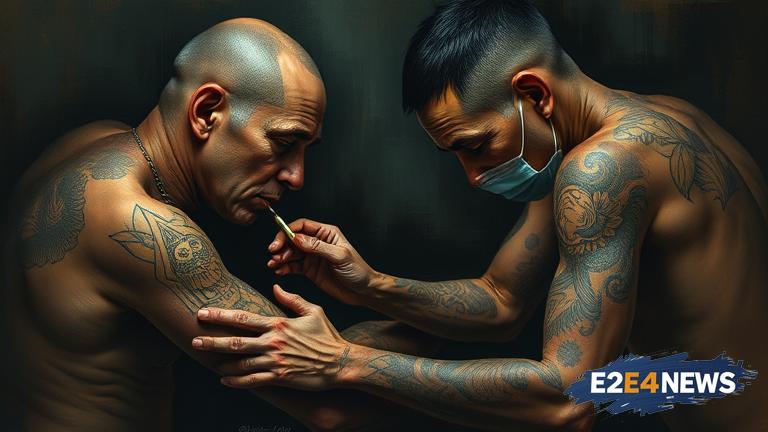Tattooing in Thailand has a long and complex history, with roots dating back to the 19th century. The practice was initially associated with prisoners and outcasts, who used tattoos to signify their status and identity. Despite its origins, tattooing has become increasingly popular in Thailand, with many young people embracing the art form as a way to express themselves. However, the stigma surrounding tattoos still persists, with many Thais viewing them as taboo. The art of tattooing was initially brought to Thailand by Chinese immigrants, who introduced their own techniques and designs. Over time, Thai tattoo artists developed their own unique style, which blended traditional Thai motifs with modern designs. The rise of tattooing in Thailand can be attributed to the country’s prison system, where inmates would often get tattoos to signify their status and affiliation. These tattoos were often crude and DIY, but they marked the beginning of a thriving tattoo culture. As tattooing became more mainstream, it began to shed its negative connotations, with many Thais embracing the art form as a way to express their individuality. Today, Thailand is home to a thriving tattoo scene, with many world-renowned artists and studios. Despite this, the stigma surrounding tattoos still persists, particularly among older generations. Many Thais still view tattoos as a sign of rebellion or deviance, and those with tattoos often face discrimination in the workplace and social settings. However, as attitudes towards tattoos continue to shift, it is likely that the stigma will eventually fade. The Thai government has also begun to recognize the cultural significance of tattooing, with efforts to preserve and promote the traditional art form. As the popularity of tattooing continues to grow, it is likely that Thailand will become a hub for tattoo enthusiasts and artists from around the world. The country’s unique blend of traditional and modern styles has already made it a destination for those looking for unique and authentic tattoos. In recent years, there has been a surge in demand for traditional Thai tattoos, with many foreigners traveling to Thailand to get inked by local artists. This has not only helped to boost the local economy but also raised awareness about the rich cultural heritage of Thai tattooing. Furthermore, the rise of social media has played a significant role in promoting Thai tattoo culture, with many artists and studios showcasing their work online. As a result, Thai tattoos have gained international recognition, with many artists being invited to showcase their work at tattoo conventions around the world. In conclusion, the history of tattooing in Thailand is complex and multifaceted, reflecting the country’s rich cultural heritage and its ability to adapt and evolve. From its origins in prison culture to its modern-day acceptance, tattooing has come a long way in Thailand, and its future looks bright.
